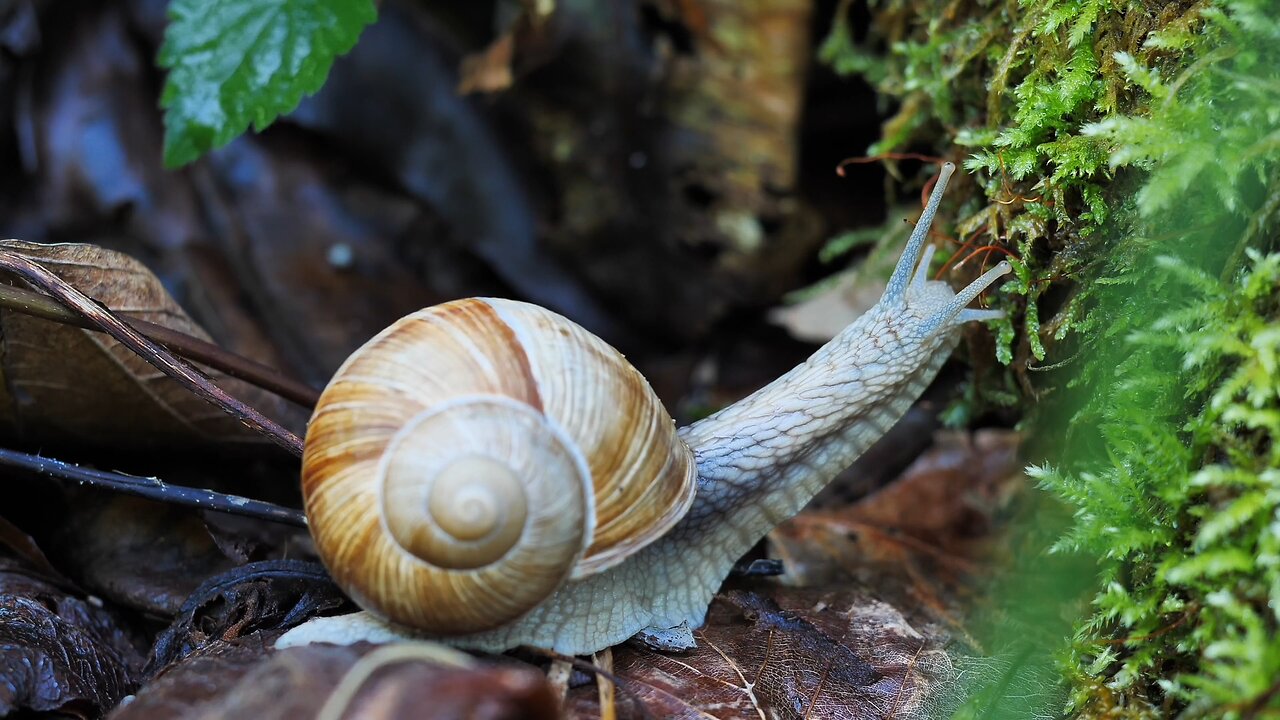Premium Only Content

"The Snail's Journey: A Look into Gastropod Life"
Snails are slow-moving mollusks that belong to the class Gastropoda. They are known for their coiled shells, which they carry on their backs. Snails can be found in a wide variety of environments, including land, freshwater, and marine habitats.
### Key Features:
- **Shell:** The most recognizable feature of a snail is its shell, which serves as protection against predators and harsh environmental conditions. The shell is usually spiral-shaped and can vary greatly in size and color depending on the species.
- **Body:** Snails have a soft, unsegmented body. They move using a muscular "foot" that secretes mucus, allowing them to glide across surfaces. This mucus also helps reduce friction and can protect the snail from sharp objects.
- **Tentacles:** Snails have two pairs of tentacles on their head. The longer pair typically has eyes at the tips, while the shorter pair is used for sensing their surroundings.
### Types of Snails:
- **Land Snails:** These snails are found on land and are commonly seen in gardens, forests, and fields. They are mostly herbivorous, feeding on plants, leaves, and fruits.
- **Freshwater Snails:** These snails live in ponds, lakes, rivers, and streams. They often feed on algae and plant material.
- **Marine Snails:** Found in the ocean, these snails can live in various marine environments, from shallow coastal waters to the deep sea.
### Behavior and Diet:
- **Movement:** Snails are known for their slow movement, which is why the term "snail's pace" is used to describe something very slow.
- **Feeding:** Most snails are herbivores, but some are omnivores or carnivores. They use a radula, a specialized feeding organ, to scrape or cut food into small pieces.
### Reproduction:
Snails are usually hermaphrodites, meaning they have both male and female reproductive organs. However, they typically still need a mate to reproduce. After mating, snails lay eggs in moist, protected environments.
### Importance:
- **Ecological Role:** Snails play an important role in the ecosystem as decomposers, helping to break down organic material. They are also a key food source for many animals, including birds, mammals, and insects.
- **Human Impact:** Snails are sometimes considered pests in agriculture and gardening because they can damage crops and plants. However, they are also valued in some cultures as a food delicacy, especially in dishes like escargot.
Snails are fascinating creatures with a unique biology and significant ecological roles, making them an interesting subject of study and appreciation.
-
 10:17
10:17
Dermatologist Dr. Dustin Portela
2 days ago $17.24 earnedOlay Cleansing Melts: Dermatologist's Honest Review
127K10 -
 1:02:20
1:02:20
Trumpet Daily
2 days ago $39.71 earnedObama’s Fake World Comes Crashing Down - Trumpet Daily | Dec. 20, 2024
85.1K58 -
 6:29
6:29
BIG NEM
1 day agoCultivating God Mode: Ancient Taoist NoFap Practices
63.2K13 -
 30:53
30:53
Uncommon Sense In Current Times
2 days ago $10.66 earned"Pardon or Peril? How Biden’s Clemency Actions Could Backfire"
77.9K5 -
 40:01
40:01
CarlCrusher
1 day agoSkinwalker Encounters in the Haunted Canyons of Magic Mesa - ep 4
72.4K9 -
 59:44
59:44
PMG
2 days ago $9.71 earned"BETRAYAL - Johnson's New Spending Bill EXPANDS COVID Plandemic Powers"
74.2K46 -
 6:48:50
6:48:50
Akademiks
1 day agoKendrick Lamar and SZA disses Drake and BIG AK? HOLD UP! Diddy, Durk, JayZ update. Travis Hunter RUN
193K34 -
 11:45:14
11:45:14
Right Side Broadcasting Network
10 days agoLIVE REPLAY: TPUSA's America Fest Conference: Day Three - 12/21/24
377K31 -
 12:19
12:19
Tundra Tactical
1 day ago $13.55 earnedDaniel Penny Beats Charges in NYC Subway Killing
83.6K16 -
 29:53
29:53
MYLUNCHBREAK CHANNEL PAGE
2 days agoUnder The Necropolis - Pt 1
169K85